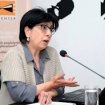Challenges to the Security of the South Caucasus Countries and NATO - 2016: Page 9 of 9
19 July, 2016
a cliché - ISIS, Al-Nusra and a couple of other groups-these are terrorists, while many others are not. Salafism and Wahhabism are not yet a criterion for classification under terroristic and non-terroristic groups, and here arises the problem of fighting against this plague. On the other hand, countries that finance and supply this flows at the highest levels remain allies. In this situation, it is unreal to speak about productive fight against terrorism.
As for Georgia, despite the fact that some time ago an antiterrorist operation was carried out here aimed at identification of facilitators and recruiters of ISIS in Pankisi, the operation was rated mostly as unproductive and superficial. In another region of Georgia-Adjara, the strengthening of the position of Turkey and of the Muslim community boosted activation of extremist groups, who also recruit fighters to serve in Syria. This has not reached notable sizes yet, but the phenomenon is already there.
Vakhtang Maisaia - I absolutely agree that the present European security system should be revised, as it already does not meet the realities of the present day international relations. I would like to highlight the factors that radically influenced the modification of the conceptual basis, generated during Yalta and Potsdam conferences in 1945 and modernized within the framework of the Conference on Security and Co-operation in Europe (1972-1975, Helsinki). After the "cold war”, the OSCE Istanbul Summit developed new European Security formula within the frameworks of the Treaty on Conventional Armed Forces in Europe (CFE). This was the basis, on which the foundations of the European security were build. However now this system is actually falling apart.







 +37410 563363
+37410 563363
 1/3 Buzand Str, 8 Floor, Yerevan, Armenia
1/3 Buzand Str, 8 Floor, Yerevan, Armenia